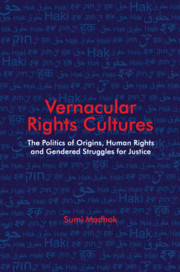 Vernacular Rights Cultures
Vernacular Rights Cultures Book contents
- Frontmatter
- Dedication
- Contents
- Acknowledgements
- 1 An Introduction: Vernacular Rights Cultures and Decolonising Human Rights
- 2 Refusing the Politics of Origins
- 3 Assembling a Feminist Historical Ontology of Haq
- 4 The Political Imaginaries of Haq: ‘Citizenship’ and ‘Truth’
- 5 Resisting Developmentalism and the Military: Haq as a Cosmological Idea and an Islamic Ideal
- 6 Conceptual Diversity, Feminist Historical Ontology and a Critical Reflexive Politics of Location
- References
- Index
4 - The Political Imaginaries of Haq: ‘Citizenship’ and ‘Truth’
Published online by Cambridge University Press: 31 July 2021
- Frontmatter
- Dedication
- Contents
- Acknowledgements
- 1 An Introduction: Vernacular Rights Cultures and Decolonising Human Rights
- 2 Refusing the Politics of Origins
- 3 Assembling a Feminist Historical Ontology of Haq
- 4 The Political Imaginaries of Haq: ‘Citizenship’ and ‘Truth’
- 5 Resisting Developmentalism and the Military: Haq as a Cosmological Idea and an Islamic Ideal
- 6 Conceptual Diversity, Feminist Historical Ontology and a Critical Reflexive Politics of Location
- References
- Index
Summary
In April 2001, India's leading current affairs magazine, Frontline, reported that 47 Adivasi people had died from hunger in Kotra Block of Rajasthan's Udaipur district (Mishra 2001). The report struck a raw nerve and made for difficult reading then, and it still continues to be a difficult read. It made for a difficult read not because the fact of hunger was unknown in postcolonial India1 or that newspaper reports had skipped stories of hunger but more because the fact of hunger has been invisibilised and rendered banal through what Sudipta Kaviraj (2010: 225) has termed ‘the logic of bureaucracy’. Policy makers prefer to use the bureaucratic term ‘drought’ and not the affective term ‘hunger’ in their reports. The erasure of ‘hunger’ and ‘starvation’ from national policy discourses represents nothing less than a national scandal for not only is hunger a constant feature of India's postcolonial timeline but also because the failure to recognise and address it unequivocally has resulted in an exponential growth in the experiential everyday reality of hunger and starvation. It is no surprise, therefore, that recent figures show that India ranked 102 out of 117 countries on the global hunger index (Global Hunger Index 2019). In contrast to the institutional reticence to acknowledge hunger, drought is a term that lends itself much more amenably to bureaucratic discourse, where it works to successfully elide the empirical fact of hunger and starvation through folding these into neat columns describing the ‘social and economic consequences’ of drought. The annals of India's drought policy weigh heavy with references to the administration, definitions and the management of drought but shed little light on the actual nature of harm and experience of hunger and starvation, brought on by drought.
However, in 2001, this bureaucratic logic governing the administrative representation of drought and its downplay of hunger received a major legal and political challenge. This legal challenge to the bureaucratic logic of drought came in the form of a public interest litigation (PIL) filed in the Supreme Court of India by the Rajasthan branch of the People's Union for Civil Liberties in April 2001. Rajasthan is India's most ‘chronically drought prone’ (Bokil 2000: 4171) region. Since 1901, the state has experienced a minimum of 48 drought years (Rathore 2004), and at the time of filing the PIL in 2001, the state was already in its third consecutive year of rainfall failure (Bokil 2000: 4171).
- Type
- Chapter
- Information
- Vernacular Rights CulturesThe Politics of Origins, Human Rights, and Gendered Struggles for Justice, pp. 99 - 143Publisher: Cambridge University PressPrint publication year: 2021


